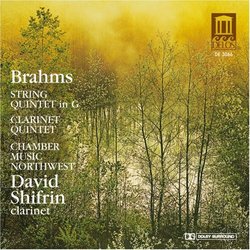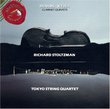| All Artists: et al Johannes Brahms (Composer) Title: Brahms: String Quintet In G Major/Quintet In B Minor Members Wishing: 0 Total Copies: 0 Label: Delos Records Original Release Date: 12/11/1992 Release Date: 12/11/1992 Genres: Special Interest, Classical Style: Chamber Music Number of Discs: 1 SwapaCD Credits: 1 UPC: 013491306629 |
Search - et al Johannes Brahms (Composer) :: Brahms: String Quintet In G Major/Quintet In B Minor
 | et al Johannes Brahms (Composer) Brahms: String Quintet In G Major/Quintet In B Minor Genres: Special Interest, Classical
Mellowed by years of triumph, loss and exaggerated disappointments, Brahms' final years as a composer were an extraordinarily rich period of summation and artistic resolution. In his last decade, by which time he was recog... more » |
Larger Image |
CD DetailsSynopsis
Album Description Mellowed by years of triumph, loss and exaggerated disappointments, Brahms' final years as a composer were an extraordinarily rich period of summation and artistic resolution. In his last decade, by which time he was recognized as the greatest composer of his time, Brahms turned almost exclusively to the medium of chamber music.The four-movement String Quintet belies its composer's advanced age. Youthfully energetic and rhythmically exciting, it also pays tribute to the Austrian music Brahms adored. In December of 1890, Brahms sent his publisher an alteration in the finale. In the accompanying letter he observed, "With this note you can take leave of my music, because it is high time to stop." Brahms felt musically spent, and was determined to retire at the peak of his form.His announcement was premature. In 1891, Brahms was thrilled to hear the playing of clarinetist Richard Mühlfeld; within months he had completed the finest work of his last years, the Clarinet Quintet, op. 115, dedicated to (and first performed by) Mühlfeld. The addition of the clarinet had a dramatic effect on Brahms' style: in this and his other works written for Mühlfeld, there is a warmth and a richness of color unique in the composer's work.Observes David Shifrin: "Brahms called Mühlfeld his prima donna. This, I think, describes Muhlfeld's operatic, vocal, expressive approach to the clarinet. There was something in the haunting quality of his playing, something in the chameleon-like quality of the instrument -- the clarinet can work very well with many different instruments, it has so many colors -- that it gave Brahms something to say that hadn't already been said."During the composition of the Clarinet Quintet, Brahms felt increasingly isolated. His emotional alienation and his renewed creative passion resulted in a work of stunning, elegiac introspection, an attempt perhaps to reconcile in musical terms a life filled with often self-imposed unhappiness. Characteristically, the formal structure of the work is impeccable: themes and patterns recur subtly throughout the quintet, creating a sense of inner cohesion (and an emotional sense of remembered loss). The gorgeous tranquility of the Adagio recalls a quote of Brahms' to Joachim: "I do not speak loudly and explicitly of that for which I inwardly hope and wish.""What a magnificent thing it is and how it moves one!" Clara Schumann wrote him after first hearing the Clarinet Quintet. "How the subtle fusion of the instruments with the soft and insistent wail of the clarinet above them lays hold of one! . . I cannot tell you how much I enjoyed it . . . The joy that I had survives in my heart and for that I am grateful." Similarly Requested CDs
|
CD ReviewsThis is fantastic G. Metcalf | United States | 10/18/2005 (5 out of 5 stars) "The two quintets presented on this CD are two of Brahms melancholic masterpieces. The Clarinet quintet is especially memorable and this version is just superb. The clarinet tone is lovely and its melodic line mixes nicely with the strings -- integrated and not antagonistic. The recording quality is fine. Highly recommended."
|

 Track Listings (8) - Disc #1
Track Listings (8) - Disc #1







